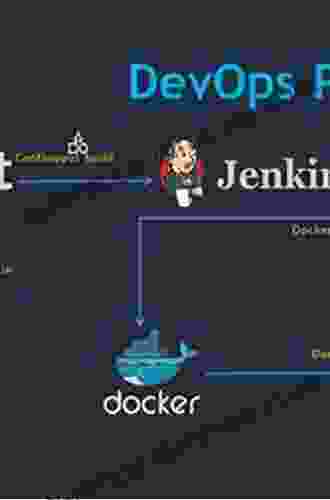Unlock DevOps Mastery: The Ultimate Guide to Docker, Jenkins, and Kubernetes

: Revolutionizing Software Delivery with DevOps
In the fast-paced world of technology, the ability to deliver software quickly and efficiently has become paramount. DevOps, a methodology that combines software development (Dev) and information technology operations (Ops),has emerged as a game-changer, transforming the way organizations build, deploy, and maintain their software systems.
At the heart of DevOps practices lie three key technologies: Docker, Jenkins, and Kubernetes. These tools empower developers and operations teams to collaborate seamlessly, automate tasks, and streamline the software delivery process. In this comprehensive guide, we will delve into each of these technologies and explore how they can help you revolutionize your DevOps journey.
4.2 out of 5
| Language | : | English |
| File size | : | 10434 KB |
| Text-to-Speech | : | Enabled |
| Screen Reader | : | Supported |
| Enhanced typesetting | : | Enabled |
| Print length | : | 366 pages |
Chapter 1: Docker - Virtualizing Your Development Environment
Docker is a containerization platform that allows you to package your application and its dependencies into a lightweight, portable container. This isolation provides several advantages, including faster development times, increased consistency, and improved security.
With Docker, developers can create and manage isolated environments for each application component, eliminating the need to install and manage dependencies on the host machine. This simplifies the development process and ensures that the application behaves the same way across different environments.
Key Features of Docker:
- Isolation: Isolates applications from the host operating system and other processes.
- Portability: Containers can be easily shared and deployed across different platforms.
- Version control: Docker images can be versioned and tracked, allowing for easy rollback and collaboration.
li>Resource optimization: Containers share the host operating system's kernel, optimizing resource utilization.
Chapter 2: Jenkins - Automating Your Software Delivery Pipeline
Jenkins is a continuous integration (CI) and continuous delivery (CD) tool that automates the building, testing, and deployment of software. By incorporating Jenkins into your DevOps pipeline, you can streamline the software development process, identify and fix issues early, and speed up delivery times.
Jenkins supports a wide range of plugins and integrations, allowing you to customize your pipeline to meet your specific requirements. It also provides a dashboard that provides real-time visibility into the status of your builds, tests, and deployments.
Key Features of Jenkins:
- Continuous integration: Automatically builds and tests code changes, triggering subsequent stages of the pipeline.
- Continuous delivery: Automates the deployment of new code to production, reducing manual intervention.
- Extensibility: Supports a vast ecosystem of plugins, allowing for customization and integration with other tools.
- Collaboration: Facilitates communication and collaboration between development and operations teams.
Chapter 3: Kubernetes - Orchestrating Your Containerized Applications
Kubernetes is a container orchestration platform that manages the lifecycle of Docker containers and ensures their availability and resilience. It provides a centralized control plane that allows you to deploy, scale, and manage containerized applications across multiple hosts.
With Kubernetes, you can gain deep insights into the health and performance of your applications. It also provides robust features such as load balancing, auto-scaling, and self-healing, ensuring that your applications remain available and performing optimally.
Key Features of Kubernetes:
- Container orchestration: Manages the lifecycle of Docker containers, including scheduling, scaling, and load balancing.
- Self-healing: Autonomously detects and recovers from container failures, ensuring application availability.
- Scalability: Automatically scales applications based on demand, optimizing performance and cost.
- Application health monitoring: Provides real-time insights into the health and performance of containerized applications.
Chapter 4: Implementing a DevOps Pipeline with Docker, Jenkins, and Kubernetes
Now that we have a solid understanding of each technology, let's explore how to combine them effectively to implement a DevOps pipeline. By integrating Docker, Jenkins, and Kubernetes, you can create an automated and streamlined software delivery process.
We will guide you step-by-step through the process of creating Docker images, building and testing code changes with Jenkins, and deploying and managing containerized applications with Kubernetes. We will cover best practices, troubleshooting tips, and real-world examples to help you get the most out of this powerful combination.
Chapter 5: Best Practices and Challenges in Docker, Jenkins, and Kubernetes
As with any technological implementation, there are certain best practices and challenges that you should be aware of when working with Docker, Jenkins, and Kubernetes. In this chapter, we will share industry-proven best practices that can help you optimize your DevOps pipeline. We will also discuss common challenges and provide strategies for overcoming them.
By following these best practices and addressing potential challenges, you can ensure that your DevOps pipeline remains efficient, reliable, and secure.
: Empowering Your DevOps Transformation
"With Docker, Jenkins, and Kubernetes" is the ultimate guide to DevOps mastery. This book provides a comprehensive overview of these essential technologies and their integration into a seamless DevOps pipeline. Whether you're a seasoned DevOps professional or just starting your journey, this book will equip you with the knowledge and skills to transform your software delivery process.
Embrace the power of Docker, Jenkins, and Kubernetes to achieve faster development times, increased reliability, and improved collaboration between your development and operations teams. By implementing the best practices outlined in this book, you can unlock the full potential of DevOps and revolutionize your software delivery capabilities.
4.2 out of 5
| Language | : | English |
| File size | : | 10434 KB |
| Text-to-Speech | : | Enabled |
| Screen Reader | : | Supported |
| Enhanced typesetting | : | Enabled |
| Print length | : | 366 pages |
Do you want to contribute by writing guest posts on this blog?
Please contact us and send us a resume of previous articles that you have written.
 Book
Book Novel
Novel Page
Page Chapter
Chapter Text
Text Story
Story Genre
Genre Reader
Reader Library
Library Paperback
Paperback E-book
E-book Magazine
Magazine Newspaper
Newspaper Paragraph
Paragraph Sentence
Sentence Bookmark
Bookmark Shelf
Shelf Glossary
Glossary Bibliography
Bibliography Foreword
Foreword Preface
Preface Synopsis
Synopsis Annotation
Annotation Footnote
Footnote Manuscript
Manuscript Scroll
Scroll Codex
Codex Tome
Tome Bestseller
Bestseller Classics
Classics Library card
Library card Narrative
Narrative Biography
Biography Autobiography
Autobiography Memoir
Memoir Reference
Reference Encyclopedia
Encyclopedia Regina Winkle Bryan
Regina Winkle Bryan Chloe Hubert
Chloe Hubert J Minter
J Minter Tony Davis
Tony Davis Mary H Rubin
Mary H Rubin Franco Cataldo
Franco Cataldo Abdus Salam
Abdus Salam Edith Medina
Edith Medina Diane Wylie
Diane Wylie Patricia Forde
Patricia Forde Audrey Carlan
Audrey Carlan Adam Michel
Adam Michel Rosalind J Marsh
Rosalind J Marsh Debbie Macomber
Debbie Macomber Harry H Harrison Jr
Harry H Harrison Jr Steven Tingle
Steven Tingle Megan Mcdonald
Megan Mcdonald Mandy Hager
Mandy Hager Michelle Ray
Michelle Ray Dave Smith
Dave Smith
Light bulbAdvertise smarter! Our strategic ad space ensures maximum exposure. Reserve your spot today!
 Cason CoxFollow ·6.8k
Cason CoxFollow ·6.8k Gus HayesFollow ·5.1k
Gus HayesFollow ·5.1k Brayden ReedFollow ·5.1k
Brayden ReedFollow ·5.1k Heath PowellFollow ·9.4k
Heath PowellFollow ·9.4k Julio Ramón RibeyroFollow ·17.2k
Julio Ramón RibeyroFollow ·17.2k Ruben CoxFollow ·16.8k
Ruben CoxFollow ·16.8k Andy HayesFollow ·6.5k
Andy HayesFollow ·6.5k Dallas TurnerFollow ·15.2k
Dallas TurnerFollow ·15.2k

 Julio Cortázar
Julio CortázarShift Your Perspective, Seize Your Potential, Own Your...
A Transformative Guide to...

 Isaias Blair
Isaias BlairPractical Algorithms For 3d Computer Graphics: Unlocking...
In the realm of digital artistry, 3D computer...

 Joseph Heller
Joseph HellerClear Vision Through Cloudy Eyes: A Guide to Overcoming...
Have you ever felt...

 Leo Tolstoy
Leo TolstoyThe True Story of My Fairygodparent Who Almost Killed Me...
Book Description In this captivating...

 Earl Williams
Earl WilliamsCanada 10 Must Visit Locations: A Captivating Journey...
Prologue: A...
4.2 out of 5
| Language | : | English |
| File size | : | 10434 KB |
| Text-to-Speech | : | Enabled |
| Screen Reader | : | Supported |
| Enhanced typesetting | : | Enabled |
| Print length | : | 366 pages |














